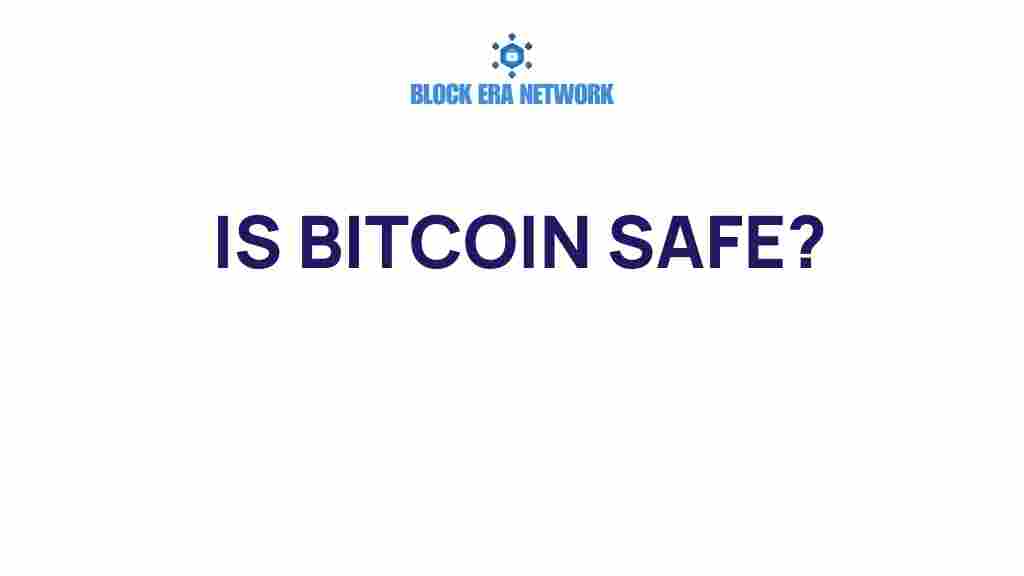Is Bitcoin Safe?
Bitcoin, the world’s first decentralized cryptocurrency, has gained immense popularity since its inception in 2009. While it offers financial freedom and innovative technology, questions about its safety persist. In this article, we will explore the myths and realities surrounding Bitcoin’s security, provide actionable tips, and help you make informed decisions about your cryptocurrency journey.
Understanding Bitcoin’s Security Model
Bitcoin’s security is primarily based on its decentralized nature, cryptographic protocols, and the blockchain. These features make it resistant to fraud, counterfeiting, and unauthorized changes. However, security risks arise mainly from user errors and external threats, not the Bitcoin network itself.
Myths About Bitcoin Security
Let’s debunk some common myths surrounding Bitcoin:
- Bitcoin can be hacked: While individual wallets or exchanges may be targeted, the Bitcoin network has never been hacked.
- Bitcoin is anonymous: Bitcoin transactions are pseudonymous. While your name isn’t displayed, your wallet address and transaction history are public on the blockchain.
- Bitcoin is inherently unsafe: The core protocol is highly secure. Vulnerabilities usually arise from improper handling or external systems.
How to Protect Your Bitcoin
Here are essential steps to ensure the safety of your Bitcoin:
1. Choose a Secure Wallet
Your Bitcoin wallet is your primary line of defense. There are several types:
- Hardware Wallets: Devices like Ledger and Trezor offer offline storage, making them highly secure against online attacks.
- Software Wallets: These are apps installed on your computer or smartphone. Ensure they come from trusted providers and are regularly updated.
- Paper Wallets: Physical documents containing your keys can be safe if stored properly, but they’re vulnerable to physical damage or loss.
2. Use Strong Passwords and Two-Factor Authentication (2FA)
Always set strong, unique passwords for your wallets and enable 2FA for an extra layer of security. Avoid reusing passwords across platforms.
3. Keep Your Private Keys Private
Your private keys grant access to your Bitcoin. Never share them and consider storing them in a secure, offline location.
4. Beware of Phishing Scams
Scammers may pose as legitimate services to steal your credentials. Always verify the authenticity of emails, links, and websites.
5. Diversify Your Storage
Don’t store all your Bitcoin in one place. Split your holdings across different wallets for better risk management.
Risks Associated with Bitcoin
Despite its security features, Bitcoin is not entirely risk-free. Here are the main risks you should be aware of:
1. Volatility
Bitcoin’s price is highly volatile, which can lead to significant gains or losses. Always invest cautiously and never risk more than you can afford to lose.
2. Exchange Risks
Cryptocurrency exchanges are popular targets for hackers. Consider using decentralized exchanges or immediately transferring your funds to a secure wallet after trading.
3. Regulatory Uncertainty
Governments worldwide have varying stances on Bitcoin. Changes in regulations can impact its usability and value.
Tips for Troubleshooting Bitcoin Security Issues
If you encounter issues with your Bitcoin, follow these steps:
- Lost Access to Wallet: Use your backup seed phrase to restore access. Always keep backups secure.
- Transaction Errors: Check the blockchain explorer to confirm the status of your transaction. Delays may occur during network congestion.
- Suspected Hack: Immediately move your funds to a secure wallet and change all related passwords. Report any suspicious activity to the wallet provider or exchange.
How Bitcoin Security Compares to Traditional Systems
Bitcoin offers several advantages over traditional financial systems:
- Decentralization eliminates single points of failure.
- Transactions are immutable, reducing fraud risks.
- Users have full control over their assets without relying on intermediaries.
However, the lack of centralized oversight means users bear full responsibility for their security.
Internal and External Resources for Further Learning
To dive deeper into Bitcoin’s security, check out our comprehensive guide on cryptocurrency safety. For industry updates, the official Bitcoin website is a reliable resource.
Conclusion
So, is Bitcoin safe? The answer largely depends on how you manage your security. While Bitcoin’s protocol is robust, user errors and external threats can lead to risks. By choosing secure wallets, safeguarding your private keys, and staying vigilant against scams, you can protect your Bitcoin investments.
Cryptocurrency is a transformative technology, but with great freedom comes great responsibility. Educate yourself, take proactive measures, and enjoy the benefits of this revolutionary digital asset.
This article is in the category and created by Block Era Network Team
